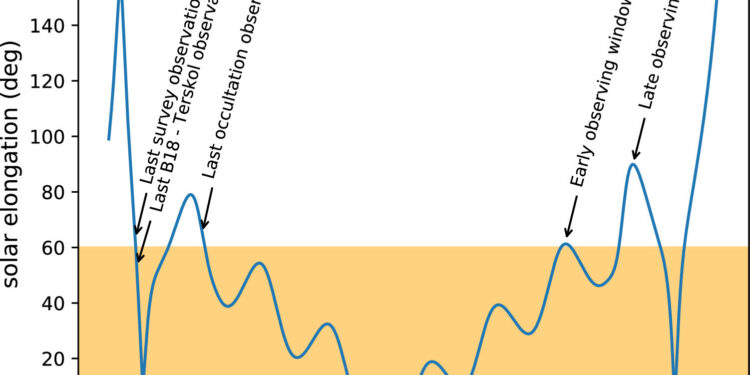The solar elongation of Apophis as seen from Earth from 2021 to 2029. The start of each year is indicated on the x-axis. Credit: Journal of Planetary Sciences (2024). DOI: 10.3847/PSJ/ad644d
An astrophysicist at the University of Western Ontario has found that the odds of asteroid 99942 Apophis hitting Earth are slightly higher than previously thought. In his study, published in The Journal of Planetary Sciences, Paul Wiegert has taken a new look at the possibility of a smaller asteroid hitting Apophis and changing its trajectory toward a collision with Earth.
In 2004, astronomers first observed an asteroid now called Apophis. The object was notable because of its high ranking on the Torino Impact Risk Scale. After noting its size and trajectory, researchers ranked it No. 4, making it the highest-ranked asteroid.
However, the rating is low enough to rule out the possibility of it hitting Earth. Scientists have instead called it an “asteroid to watch” for the coming years. The asteroid is expected to pass close to Earth in 2029, and again in 2036 and 2068.
For this new study, Wiegert considered the possibility that a smaller object could hit Apophis and slightly alter its trajectory. What were the chances, he wondered, that such an impact would put Apophis on a collision course with Earth?
To find the answer, he started by noting that objects of different sizes moving at different speeds would cause different trajectory changes. He found that an object as small as 0.6 meters in diameter could be large enough to push the asteroid into a collision course after 2029. He also found that an object just 3.4 meters in diameter could strike with enough force to push Apophis into a collision course with Earth by 2029.
Wiegert then looked for a way to estimate the number of objects likely to hit Apophis. He used the number of 3.4-meter-diameter objects that hit Earth each year as a reasonable benchmark. He then used that number to calculate the probability of such an object hitting Apophis and found that it was about 10–8which is, of course, weak.
Noting also that such a collision would have to occur at exactly the right angle, he estimates that the chances of a perfect impact are 1 in 2 billion. And he estimates that the chances of such a collision resulting in a subsequent impact are 1 in 1 million.
More information:
Paul Wiegert, On the sensitivity of the 2029 Apophis approach to Earth to small asteroid impacts, Journal of Planetary Sciences (2024). DOI: 10.3847/PSJ/ad644d
© 2024 Science X Network
Quote:Asteroid 99942 Apophis’ odds of hitting Earth slightly higher than expected (2024, September 12) retrieved September 13, 2024 from
This document is subject to copyright. Apart from any fair dealing for the purpose of private study or research, no part may be reproduced without written permission. The content is provided for informational purposes only.



